In this edition
From the Acting Director of Early Learning
Dear Families
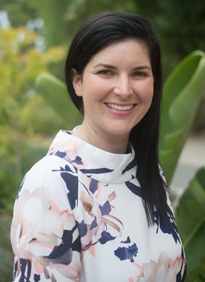
This year we were selected by the South Australian Government as a prototype centre for Project Quattro, aiming to embed the Reggio Emilia principles in an authentic and respectful manner. This acclamation has enabled us to be at the forefront of early childhood professional learning in South Australia. It is an honour to be recognised as a leading educational facility in this area, especially as we are the only Independent School to receive this title.
Last week Kate, Caterina and myself presented an update on where our research currently stands, our challenges, questions and provocations regarding our next steps to Professor Carla Rinaldi, project leaders and the other three prototype sites.
Professor Rinaldi is acclaimed worldwide for her inspirational speaking and writing relating to the educational project of Reggio Emilia. She is currently the President of both Reggio Children and the Malaguzzi Centre Foundation. Professor Rinaldi accepted the invitation from the Government of South Australia to be one of their Thinkers in Residence during 2012.
Our presentation to Professor Rinaldi and other prototype colleagues focused on our journey with our ‘Planning for the Possible’, which is the planning cycle used across our ELC. It encompasses the planning, documenting and evaluation of the learning process. This model reflects our strong image of child, as well as authentic and meaningful learning driven by child-initiated provocations and the IB Primary Years Programme.
Professor Rinaldi reminded us about the investment that the State has made to Project Quattro and the responsibility we have to be the strong voice for early childhood education. We have a unique opportunity to make changes, shift perspectives and the image of child through our research and how we share this with others. We are excited about our continued involvement in Project Quattro and I encourage you to engage the educators in conversation about the ‘Planning for the Possible’ and how it is enhancing the inquiry learning in their environments.
Kind regards
Kirsty Porplycia
Acting Director of Early Learning
Friends of the ELC Welcome Morning Tea
Last Thursday the Friends of the ELC hosted a beautiful Welcome Morning Tea which provided families with the chance to connect with each other and the educators, as you would have seen in the video above.
We thank the Friends of the ELC for the opportunities they provide for our community to come together and connect.
Please ensure that you ‘like’ St Peter’s Girls’ School on Facebook if you would like to view the wonderful videos that are made after events such as these.
Save the Date
29 August: Fathers and Special Friends’ Breakfast, 7.45am
12 September: Grandparents and Special Friends’ Afternoon Tea, 2pm
16-18 September: Parent-Teacher Conversations
Save the Date – Fathers and Special Friends’ Breakfast
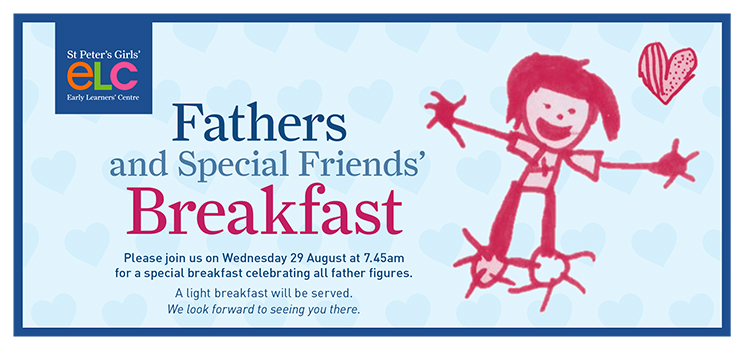
Please save the date for our Fathers and Special Friends’ Breakfast celebrating all father figures, on Wednesday 29 August at 7.45am.
A light breakfast will be served. We look forward to seeing you there.
UniSA Student Teachers
We would like to take this opportunity to welcome our Student Teachers Miss Kim Brooks and Miss Olivia Sam to St Peter’s Girls’ Early Learners’ Centre.
Miss Brooks will be working alongside the educators in the Hallett Room and Miss Sam will be in the Stonyfell Room. They will be working alongside their mentor teachers to plan, engage and observe children in a range of learning experiences.
We are looking forward to the opportunity to support their professional growth.
Digital Communication in the ELC
Your child’s Canvas homepage is a dynamic online sharing space that invites you to participate in your child’s learning as it happens. It provides a window into your child’s life at the ELC as educators share intentional teaching, specialist lessons and spontaneous moments.
We can share videos and images directly with parents that capture the rich learning experiences in which your child is engaged throughout their time at the ELC. The Canvas homepage also enables us to share more of the process of learning – rather than just the end product.
In addition to the Canvas homepage, your child will have their own ePortfolio which will show their engagement in the learning inquiry each term.
Please note: if there is a photo of your child that also includes another child, it must not be shared on social media.
Ada the Humanoid Robot
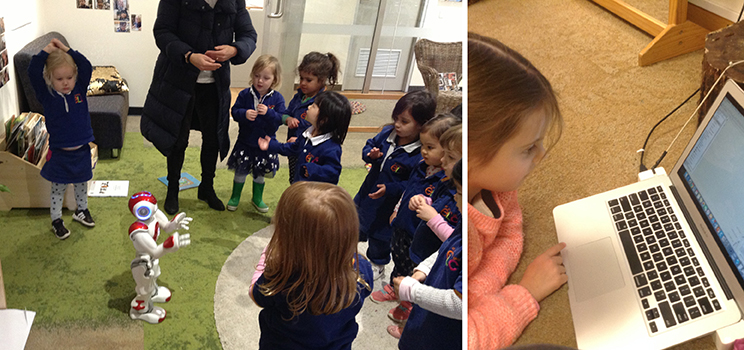
Over the last few weeks the Bell Yett and Hallett children have enjoyed experimenting with Ada, the Humanoid Robot. They have explored her features and functions alongside Miss Lockwood and Miss Boccaccio.
The Bell Yett children have further developed their relationship with Ada by taking time to look closely at her figure and how she is put together. They have also enjoyed listening to her sing familiar songs.
The Hallett children have continued their explorations from last term working alongside the Year 8 students and learning how to program Ada using software on the computer. In small groups working alongside Miss Lockwood, the children have programmed Ada to sing, dance, talk and wave.
Save The Date – Ladies’ Day Out
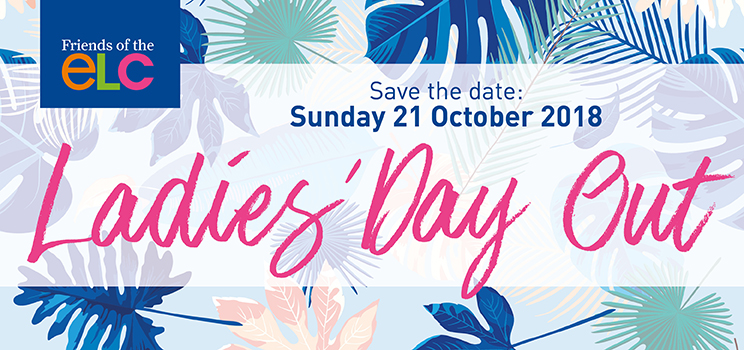
A Message from Mrs Yu
亲爱的家长朋友们,
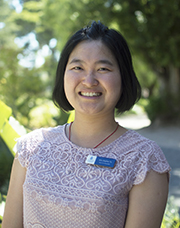
ELC数字通信
您孩子的Canvas主页是一个动态的在线分享空间,邀请您随时参与孩子的学习。它为您了解孩子在ELC的生活提供了一个窗口,比如,教育工作者与孩子们分享有意识的教学,专业课程和一些自发学习的时刻。我们可以直接与家长分享视频和图像,捕捉孩子在ELC期间所参与的丰富学习。 Canvas主页还使我们能够分享更多的学习过程 – 而不仅仅是最终产品。除了Canvas主页外,您的孩子还将拥有自己的电子档案馆,这些电子档案馆将在每学期展示他们对不同学习方面的参与度。请注意:如果您的孩子的照片中还包含另一名儿童,则不得在社交媒体上分享。
Mrs Sophie Yu
News from the Stonyfell Room
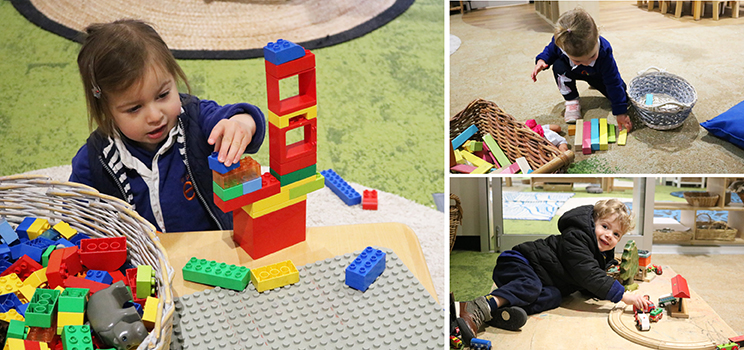
Providing opportunities for learning at every moment
Mathematics is all around us; our world is governed by its rules, its patterns support the flow of our day, and we can see connections and relationships form through these patterns.
In the Stonyfell Room, we as the educators have been looking for the mathematics that can often lay hidden in our everyday lives. We have been putting on our ‘mathematical glasses’ and through these we have seen the endless possibilities that our environment offers for our children to be exposed to mathematical ideas and thinking.
One area that we have been able to introduce specific mathematical language is when we have been exploring and playing with our abundance of blocks and construction materials. These resources give us the opportunity to see our children problem solving and challenging themselves. During these times we are able to include specific language about measurement, comparison and classification.
In bringing mathematics to the forefront of our thinking we have been able to utilise every moment of our day and see the mathematics that is everywhere in our world.
Laura Reiters
News from the Bell Yett Room
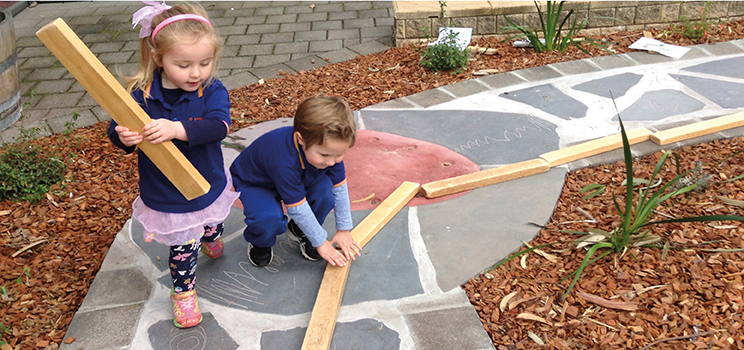
‘Mathematics plays an important part in our everyday lives. We use maths when we read a bus timetable, find our favourite TV program, weigh out ingredients for cooking, check our money at the supermarket, or set the table for dinner’.
– The Early Years Learning Framework (EYLF) (DEEWR, 2009)
Numeracy is about more than just counting. Over the last few weeks we have been inviting the children to ‘think as a mathematician’ as we explore Ferguson Park and the ELC gardens. Mathematical opportunities present themselves every day, both indoors and outdoors. As we enter these spaces we invite the children to:
- Recognise patterns
- Sort and categorise objects
- Measure and calculate amounts
- Arrange objects and identify shapes
- Talk about time and the patterns of the day.
These are all examples of mathematical thinking that we are exploring with the children.
The Bell Yett Room offers many opportunities for the children to problem-solve and explore their world mathematically. Our Light Room has been intentionally designed with blocks of all sizes and shapes to allow the children to sort, create pattern, build, record or to just explore as they are learning. These experiences encourage mathematical thinking and the use of mathematical concepts and language.
Please look at our Canvas homepage to see mathematics in action in the Bell Yett Room.
Nell Tierney and Jess Ash
News from the Ferguson Room
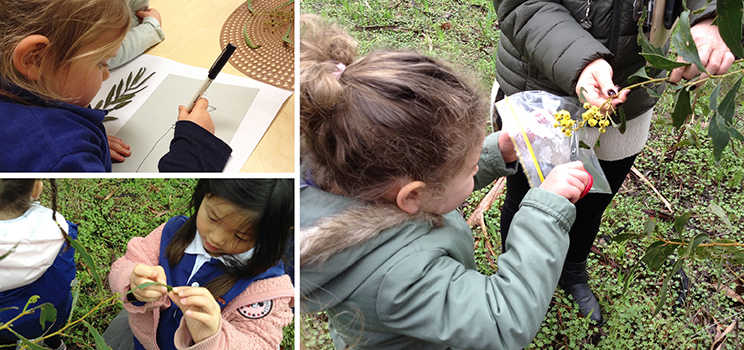
What do you think of when you hear the word ‘mathematics’?
What are your memories of mathematics at school?
How do you talk to your child about mathematics?
Most of us have an opinion about mathematics, and many of us are influenced by the experience we had at school. In the ELC we use an inquiry-based approach to learning, allowing for children to make use of their natural curiosity and enthusiasm for making sense of their world. Using authentic, meaningful contexts is key to igniting a child’s passion for mathematics.
In Ferguson Park we are continuing our learning from previous terms to develop connections with, and empathy towards, the natural environment. We have invited the children to collect small samples of interesting leaves and grasses to study. Children love collecting things, and so we are able to connect the intentions of the child and those of the educator very easily.
Working as mathematicians we can sort, count, notice, observe, describe and collect data. The children have also:
- Written the date on their specimen
- Made a graphic representation of their plant specimen
- Used a reference book to locate their plant specimen and to find its botanical name, requiring them to compare and contrast different plant specimens
- Discussed the shapes, colour and symmetry of their plant specimen.
We are also extending our mathematical inquiry to other areas of learning, including dance, music and the atelier of scents. In our literacy work we are developing a dictionary of Kaurna words that includes counting from 1-10. Our friend and Aboriginal Elder, Tamaru, is guiding us with this work. I will share more about this with you in the next newsletter and also on our Canvas page.
Mel Angel
News from the Hallett Room
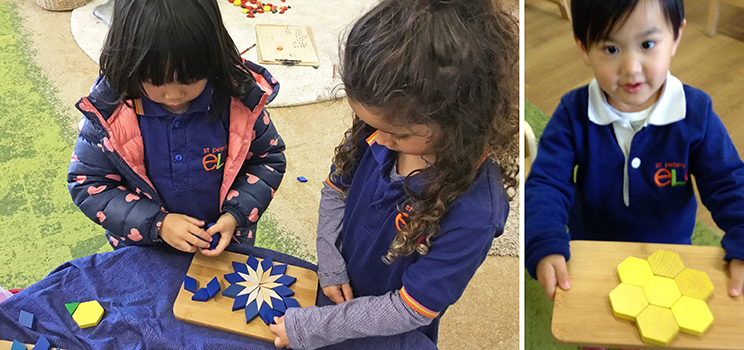
Last Monday evening I was joined by families who were eager to discover how the inquiry process supports dispositions for lifelong learning. We shared our intent to provoke wonder and curiosity about mathematics and explored the learning environment which enhances the children’s engagement in our inquiry.
Through listening and observing, we are able to discover the children’s curiosities and establish an environment that transforms their wonder into knowledge.
We have discovered that many of the children have a sound prior knowledge of 2D shapes and they are keen to share their understandings through mark making, photography and exploring the materials provided.
We are challenging the children to move beyond what they already know through intentional questions such as:
- What makes this shape a square?
- How is it the same/different to another shape?
- Is a square always a square?
These questions have inspired the children to engage in the materials in more complex ways as they explore symmetry, pattern and tessellation.
We invite you to spend some time exploring the documentation in the Hallett Room either in person or via our Canvas homepage.
Many thanks to the families who braved the cold and wet weather to join us for this information session. We hope to provide more of these opportunities and would love to hear from you about topics that interest you and times that are convenient.
Leanne Williams
